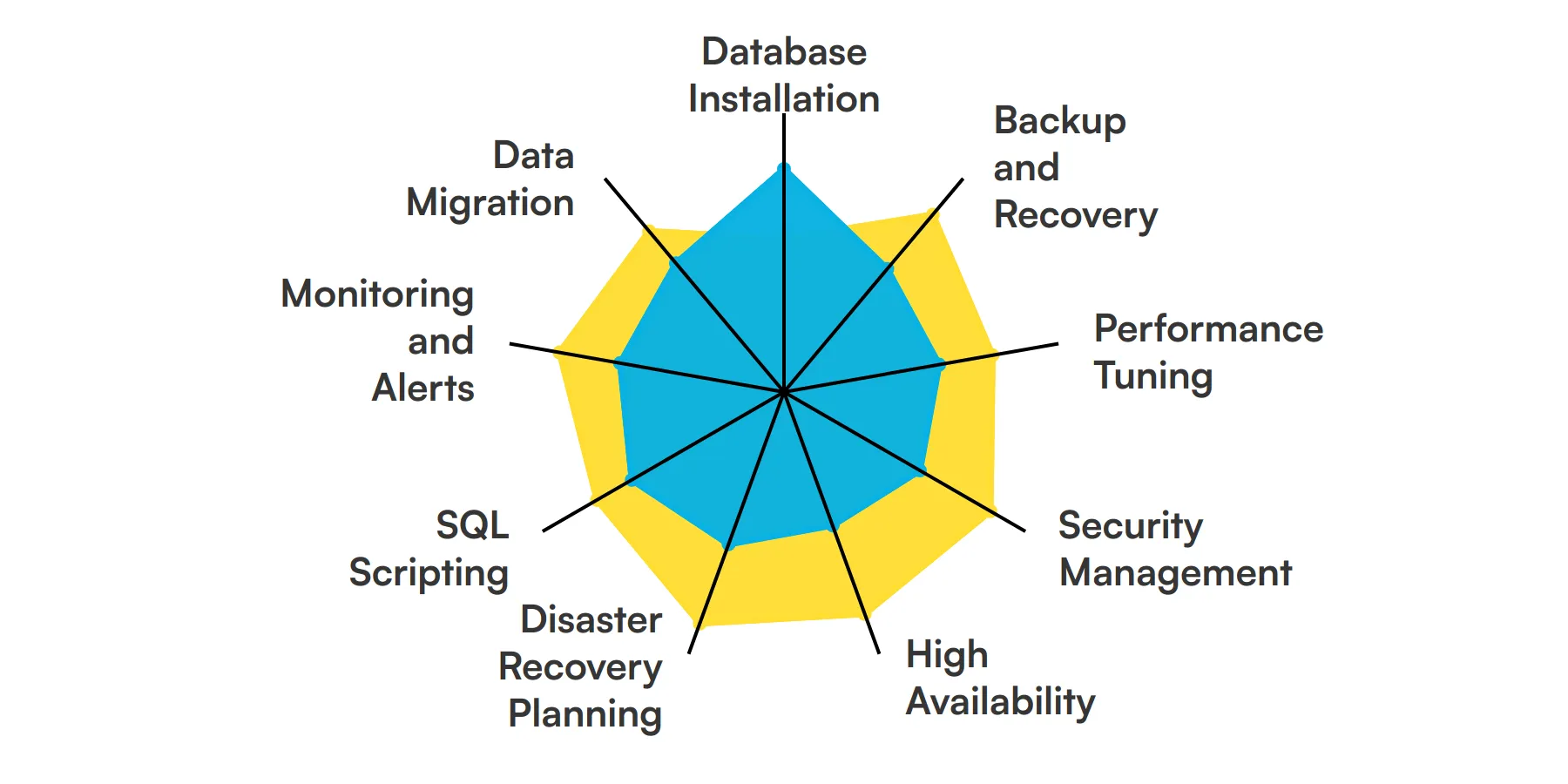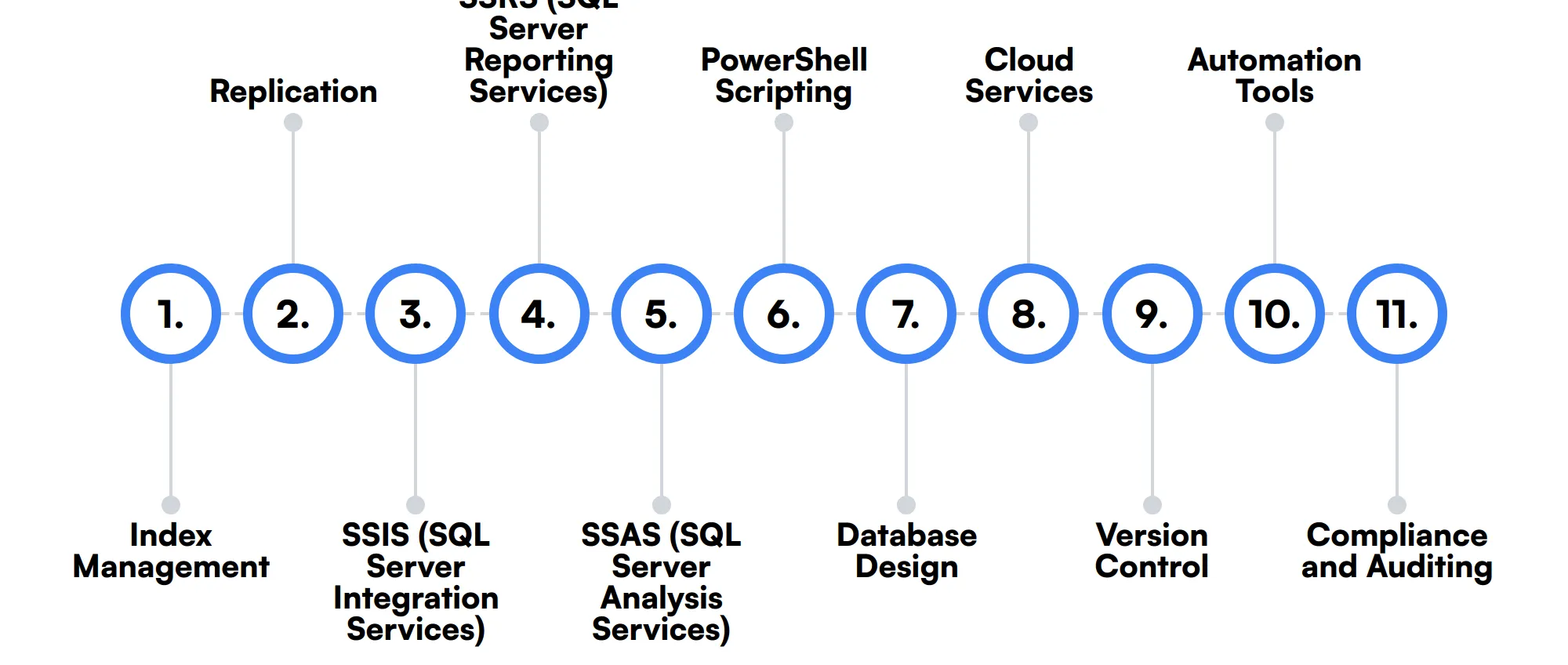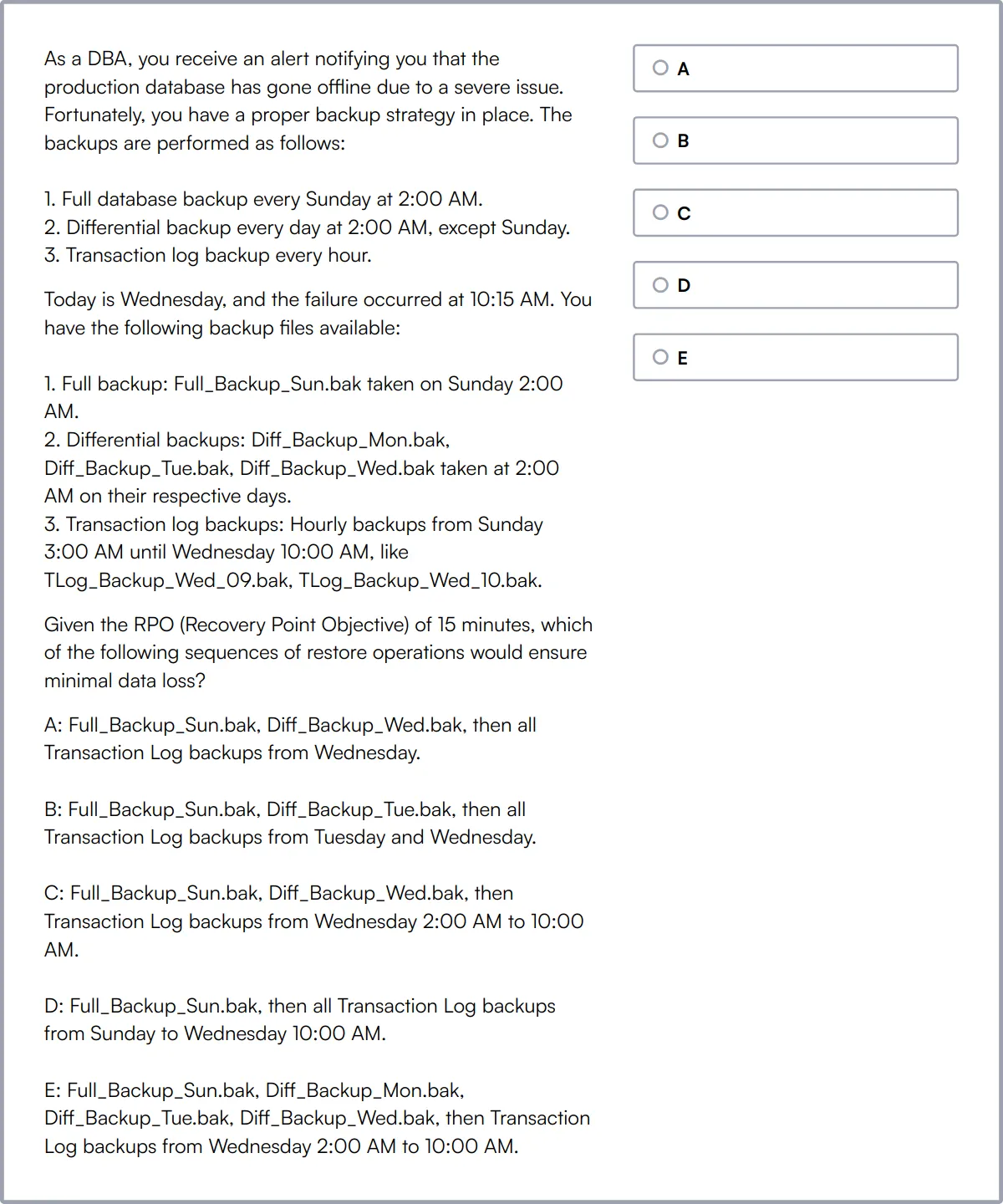SQL Server DBAs are the backbone of database management systems, ensuring that data is stored, retrieved, and managed efficiently. They play a critical role in maintaining the health, performance, and security of databases, which are essential for the smooth operation of any organization.
The skills required for a SQL Server DBA include a deep understanding of SQL Server architecture, proficiency in T-SQL, and experience with performance tuning and optimization. Additionally, they must possess strong problem-solving abilities and effective communication skills to collaborate with other IT professionals and stakeholders.
Candidates can write these abilities in their resumes, but you can’t verify them without on-the-job SQL Server DBA skill tests.
In this post, we will explore 9 essential SQL Server DBA skills, 11 secondary skills and how to assess them so you can make informed hiring decisions.
Table of contents
9 fundamental SQL Server DBA skills and traits
The best skills for SQL Server DBAs include Database Installation, Backup and Recovery, Performance Tuning, Security Management, High Availability, Disaster Recovery Planning, SQL Scripting, Monitoring and Alerts and Data Migration.
Let’s dive into the details by examining the 9 essential skills of a SQL Server DBA.

Database Installation
A SQL Server DBA must be adept at installing and configuring SQL Server instances. This involves setting up the server environment, ensuring compatibility with existing systems, and optimizing the initial configuration for performance and security.
For more insights, check out our guide to writing a Database Administrator (DBA) Job Description.
Backup and Recovery
Ensuring data integrity and availability is a core responsibility. A DBA must design and implement backup strategies, perform regular backups, and be prepared to restore data quickly in case of failure or data corruption.
Performance Tuning
DBAs need to monitor and optimize the performance of SQL Server databases. This includes identifying slow-running queries, optimizing indexes, and adjusting server configurations to ensure efficient data retrieval and processing.
Check out our guide for a comprehensive list of interview questions.
Security Management
Protecting sensitive data is paramount. A DBA must implement and manage security measures such as user authentication, role-based access control, and encryption to safeguard the database from unauthorized access and breaches.
High Availability
To minimize downtime, a DBA should be skilled in setting up and managing high availability solutions like clustering, replication, and Always On Availability Groups. This ensures continuous database operation even during maintenance or unexpected failures.
Disaster Recovery Planning
A DBA must develop and maintain a comprehensive disaster recovery plan. This involves preparing for various failure scenarios, ensuring data can be restored quickly, and minimizing data loss to keep business operations running smoothly.
SQL Scripting
Proficiency in writing and optimizing SQL scripts is essential. This skill allows a DBA to automate routine tasks, create complex queries, and manage database objects effectively, enhancing overall database performance and management.
For more insights, check out our guide to writing a SQL Developer Job Description.
Monitoring and Alerts
Continuous monitoring of database health and performance is crucial. A DBA should set up and manage monitoring tools and alerts to detect and address issues proactively, ensuring the database operates smoothly and efficiently.
Data Migration
DBAs often need to migrate data between different systems or versions of SQL Server. This requires careful planning, execution, and validation to ensure data integrity and minimal downtime during the migration process.
11 secondary SQL Server DBA skills and traits
The best skills for SQL Server DBAs include Index Management, Replication, SSIS (SQL Server Integration Services), SSRS (SQL Server Reporting Services), SSAS (SQL Server Analysis Services), PowerShell Scripting, Database Design, Cloud Services, Version Control, Automation Tools and Compliance and Auditing.
Let’s dive into the details by examining the 11 secondary skills of a SQL Server DBA.

Index Management
Proper index management can significantly improve query performance. A DBA should know how to create, maintain, and optimize indexes to ensure efficient data retrieval.
Replication
Understanding SQL Server replication is important for data distribution and synchronization across multiple databases. This skill helps in maintaining data consistency and availability across different locations.
SSIS (SQL Server Integration Services)
SSIS is used for data integration and workflow applications. A DBA should be familiar with creating and managing SSIS packages to automate data import, export, and transformation tasks.
SSRS (SQL Server Reporting Services)
Knowledge of SSRS allows a DBA to create, manage, and deploy reports. This skill is useful for providing business insights and data analysis through customized reporting solutions.
SSAS (SQL Server Analysis Services)
SSAS is used for online analytical processing (OLAP) and data mining. A DBA should understand how to design and manage SSAS cubes to support complex data analysis and business intelligence applications.
PowerShell Scripting
PowerShell can automate many administrative tasks. A DBA should be able to write and execute PowerShell scripts to streamline database management and improve efficiency.
Database Design
Good database design is crucial for performance and scalability. A DBA should understand normalization, indexing strategies, and schema design to create efficient and maintainable databases.
Cloud Services
With the rise of cloud computing, knowledge of cloud-based SQL Server solutions like Azure SQL Database is beneficial. This includes understanding cloud architecture, deployment, and management.
Version Control
Using version control systems for database scripts and configurations helps in tracking changes and collaborating with development teams. A DBA should be familiar with tools like Git for managing database code.
Automation Tools
Automation tools like SQL Server Agent or third-party solutions can help in scheduling and automating routine tasks. A DBA should know how to leverage these tools to improve operational efficiency.
Compliance and Auditing
Ensuring compliance with industry regulations and internal policies is important. A DBA should implement auditing mechanisms to track database activities and maintain compliance with standards like GDPR or HIPAA.
How to assess SQL Server DBA skills and traits
Assessing the skills and traits of a SQL Server DBA is a nuanced process that goes beyond just glancing at a resume. While a resume might highlight experiences with Database Installation or Disaster Recovery Planning, it doesn't provide a clear picture of the candidate's hands-on capabilities or problem-solving skills.
To truly understand whether a candidate can handle the complexities of SQL Server management, including tasks like Performance Tuning, Security Management, and Data Migration, a more dynamic and thorough assessment method is required. This is where practical skills assessments come into play.
Using Adaface assessments, you can evaluate a candidate's proficiency in real-world scenarios that involve Backup and Recovery, High Availability, and SQL Scripting among other critical skills. These assessments are designed to mimic the challenges a DBA faces daily, ensuring that your hiring process not only identifies skilled individuals but also those who can immediately contribute to your team's success. By integrating Adaface assessments into your hiring process, you can achieve an 85% reduction in screening time while significantly improving the quality of your hires.
Let’s look at how to assess SQL Server DBA skills with these 2 talent assessments.
MS SQL Server Online Test
Our MS SQL Server Online Test evaluates candidates on their proficiency with Microsoft SQL Server, a widely-used relational database management system. The test measures the ability to design and manage SQL databases, write SQL queries and stored procedures, and perform data modeling and optimization.
The test assesses candidates on their knowledge of SQL querying, database management, normalization, and the use of indexes, constraints, transactions, stored procedures, triggers, and views. It challenges candidates to apply these skills in scenario-based multiple-choice questions to demonstrate their practical knowledge and problem-solving abilities.
Successful candidates demonstrate a thorough understanding of Microsoft SQL Server, showcasing their ability to optimize database performance and ensure data integrity through effective design and management practices.

SQL Coding Test
Our SQL Coding Test is designed to evaluate a candidate's skills in designing and building relational databases and tables from scratch. It tests the ability to perform CRUD operations, write efficient queries and subqueries, and create effective indexes for faster SQL query performance.
This test covers creating and deleting tables, performing CRUD operations, utilizing joins and subqueries, and employing conditional expressions and procedures. It includes both multiple-choice questions and a hands-on SQL coding question to assess practical skills in a realistic scenario.
Candidates who score well on this test are proficient in SQL coding, capable of implementing complex database solutions and optimizing data retrieval and manipulation for real-world applications.

Summary: The 9 key SQL Server DBA skills and how to test for them
| SQL Server DBA skill | How to assess them |
|---|---|
| 1. Database Installation | Evaluate ability to install and configure SQL Server environments correctly. |
| 2. Backup and Recovery | Assess skills in implementing reliable backup and recovery strategies. |
| 3. Performance Tuning | Check proficiency in optimizing database performance and resource usage. |
| 4. Security Management | Determine knowledge of securing databases against unauthorized access. |
| 5. High Availability | Gauge expertise in configuring systems for minimal downtime. |
| 6. Disaster Recovery Planning | Test planning and execution skills for database disaster scenarios. |
| 7. SQL Scripting | Measure proficiency in writing and optimizing SQL scripts. |
| 8. Monitoring and Alerts | Assess setup of comprehensive monitoring and alerting systems. |
| 9. Data Migration | Evaluate experience in safely migrating data between systems. |
SQL Server Online Test
SQL Server DBA skills FAQs
What are the key skills required for a SQL Server DBA role?
Key skills include Database Installation, Backup and Recovery, Performance Tuning, Security Management, High Availability, Disaster Recovery Planning, SQL Scripting, and Monitoring and Alerts.
How can recruiters assess a candidate's experience with Database Installation?
Ask candidates to describe their experience with installing SQL Server, including any challenges faced and how they resolved them. Request examples of different environments they have set up.
What questions should be asked to evaluate a candidate's Backup and Recovery skills?
Inquire about their experience with different backup types, recovery models, and any real-life scenarios where they had to perform a database recovery.
How can a candidate's Performance Tuning skills be assessed?
Ask for specific examples of performance issues they have resolved. Request details on the tools and techniques they used, such as indexing, query optimization, and monitoring tools.
What is the best way to evaluate a candidate's knowledge in High Availability and Disaster Recovery Planning?
Discuss their experience with technologies like Always On Availability Groups, Failover Clustering, and Log Shipping. Ask for examples of disaster recovery plans they have implemented.
How can recruiters verify a candidate's SQL Scripting proficiency?
Request candidates to write or review a SQL script during the interview. Discuss their experience with writing complex queries, stored procedures, and triggers.
What should recruiters look for when assessing skills in SSIS, SSRS, and SSAS?
Ask about their experience with designing and deploying SSIS packages, creating SSRS reports, and developing SSAS cubes. Request examples of projects they have worked on.
How important is PowerShell Scripting for a SQL Server DBA, and how can it be assessed?
PowerShell is useful for automation. Ask candidates to describe scripts they have written to automate tasks. Request a demonstration or a sample script if possible.
Assess and hire the best SQL Server DBAs with Adaface
Assessing and finding the best SQL Server DBA is quick and easy when you use talent assessments. You can check out our product tour, sign up for our free plan to see talent assessments in action or view the demo here:

40 min skill tests.
No trick questions.
Accurate shortlisting.
We make it easy for you to find the best candidates in your pipeline with a 40 min skills test.
Try for freeRelated posts
Free resources



